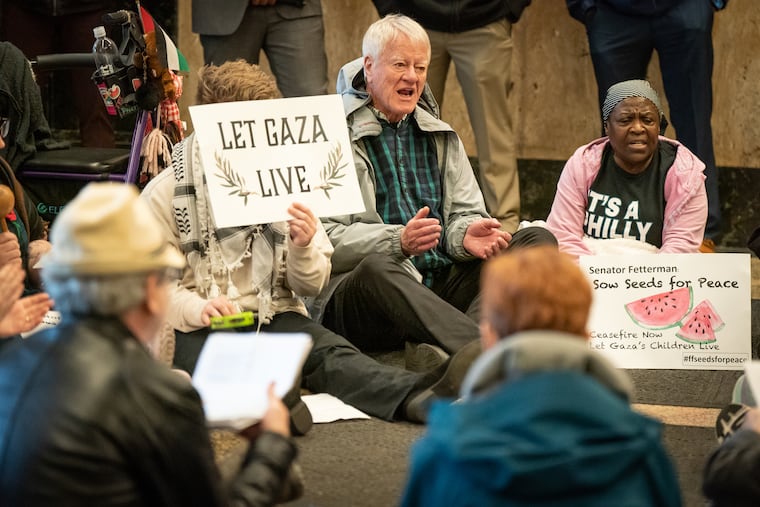Quaker activist and life-long peacekeeper George Lakey is now the subject of a documentary
'Citizen George' follows Lakey through his early days in the Civil Rights Movement to his recent demands for climate justice

At age 12, Bangor, Pa., native George Lakey knew fighting for the freedoms and justice of the underserved was his calling, even if it meant ending up in handcuffs.
As a child preacher at his evangelical church, Lakey, who grew up in a working-class family, delivered a sermon saying that racial equality was the will of God. The assembly was left divided by this call for social justice, but the would-be-activist recognized his role as a world-changer.
The now 86-year-old Quaker, nonviolent protester, “peacekeeper,” and West Philly resident has continued his mission for social and environmental change in the face of all the backlash, tension, and legal troubles that have followed through decades of professional troublemaking.
Believing that there’s some of God in everyone, Lakey has been an activist from the days of the civil rights movement. And while he’s chronicled his work as a hopeful for humankind in a series of books, his story is at the center of a new documentary, Citizen George.
“His life’s mission is as relevant today at 86 as it was when he was 12 years old,” said Philadelphia-based filmmaker and the film’s director, Glenn Holsten. “His message and his mission are the same. It’s been there from the start. And I would love to think that we all have that capability.” (Holsten is married to Inquirer classical music writer Peter Dobrin.)
The film premiered at the Philadelphia Film Festival on Sunday. A second screening is set for Sunday, Oct. 27.
Holsten, who has directed documentaries like Beyond the Bullet and Jamie Wyeth and the Unflinching Eye, chronicled Lakey’s upbringing in a racist coal mining town, his years soaking up civil rights movement teachings, his travels as a voice for nonviolent protest, and the persistence of lifelong advocacy.
The documentary also explores Lakey’s trying relationship with his children, his battle with a rare and often fatal form of lymphoma, and his continued “direct education” in becoming a social justice warrior.
Arrests are commonplace for Lakey, who moved to Philly in the 1960s..
First arrested in 1963, for participating in a sit-in against segregation in Chester, Lakey was last arrested in April when he and a dozen protesters stood outside Sen. John Fetterman’s office in Philly calling for a cease-fire in the Israel–Hamas war.
In the late 1950s, Lakey was active in the ban-the-bomb movement, and went on to join fellow civil rights activists as a trainer in 1964’s Mississippi Freedom Summer, and co-organizer an anti-sexism movement for men called Men Against Patriarchy in the ’70s. Lakey later came out as bisexual and became a leading voice in the LGBTQ movement.
In 1991, he and fellow Philadelphia activist Barbara Smith also founded Training for Change, where they trained activists and groups on the best practices for nonviolent protest. He has taught at Haverford College, Temple University, and Swarthmore College.
The name of the film, a spin on Orson Welles’ Citizen Kane, highlights Lakey’s views on the rights of global citizens. The exact mindset and bravery Lakey has long held, Holsten said, is what’s needed in many corners of the world today.
Holsten met Lakey through actor Grace Gonglewski, who wrote an email to the filmmaker, urging him to make a film on this “extraordinary man who was fierce and super interesting,” whose story needed to be told.
When he met Lakey, Holsten was “entranced” by Lakey’s unshakable positivity and his continued fight for social change. And with the COVID-19 pandemic in full swing, Holsten felt his story was a necessary glimmer of light during a time of darkness.
“Lakey was full of light and hope for the future, and really optimistic that these dark times are perfect ground for change,” Holsten said. “So I decided I needed some of that energy, so I latched onto it.”
Lakey showed Holsten an advanced copy of his memoir, Dancing with History, and the film’s scenes began popping up in the director’s mind with each passing page. “It was just a good set of ingredients,” he said.
While he wouldn’t admit to having a “controlling personality,” Lakey said it was difficult relinquishing creative reign. He’s written 11 books on his experience as a nonviolent protester but to have his personal life come under Holsten’s lens was a “vulnerable and exposing” experience.
Relying on Holsten’s abilities as a filmmaker and psychologist, Lakey said he’s excited for people to see his story take on visual form, both his triumphs in the heat of life-risking protests and the challenges he’s faced as a family man.
The first viewing of the film, he said, took him to an “altered state psychologically.” “I was a wreck the rest of the day,” Lakey joked. “There’s something about that incredible vulnerability that can be a little more than most of us want sometimes.”
Holsten and Lakey hope the film encourages viewers to be positive fixtures in society, and to embrace the powers of love and “fearful energy” to better the lives of citizens of all creeds.
“The idea [that] we can be vibrant, active Americans participating in our system is a very important way for all of our lives,” Holsten said. “And it’s not just for today, it’s of course for generations to come.”
Citizen George premiered on Sunday. A second screening is set for Sunday, Oct. 27, at 5:30 p.m. at Film Society East, 125 S. Second St., Phila. For tickets, visit filmadelphia.org.